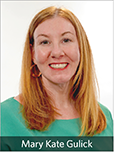Female financial professionals are being hit with a double challenge.
Not only is the financial industry ineffective at recruiting women into the profession, but it also has a problem retaining female financial advisors, according to Mary Kate Gulick, senior vice president of advisor marketing for the Carson Group, a financial services firm and consultant based in Omaha, Neb.
 Even after years of effort on the part of firms and organizations within the financial industry, the needle has moved very little for the advancement of female financial professionals.
Even after years of effort on the part of firms and organizations within the financial industry, the needle has moved very little for the advancement of female financial professionals.
“Frankly, I expected to see more movement for women in the industry,” Gulick said in an interview. “One of our most pressing problems as an industry is the under-representation of women.” Gulick will speak at Financial Advisor magazine’s Invest In Women conference, to be held in Atlanta next week.
The Certified Financial Planner Board of Standards reported that only 23.5% of CFP professionals are women, a number that has stayed flat since the first study was conducted in 2013. In the broader world of financial advice, only 15% to 20% of advisors are women, according to Barron’s. The American College of Financial Services found that only one-third of advice firms have women in client-facing roles.
The numbers show that recruitment efforts are, for the most part, ineffective, according to research conducted by the Carson Group. The report, “2022 State of Women in Wealth Management,” included 335 financial professionals, 79% of whom were women. Combined with the recruitment problem is the fact that firms are doing a poor job of advancing and retaining female professionals, Gulick said.
In the survey for the report, only 16% of respondents agreed that industry organizations and firms effectively promote financial advice as a career attractive to female students, while nearly 53% of respondents said the industry does a poor job.
One of the most effective ways of getting women to stay in the profession and enabling them to advance their careers is to provide mentors, who can be either male or female. “The women who have stayed in the business are the ones who have had good mentors,” Gulick said.
Firms not only have to actively participate in a mentorship program, but the leadership needs to make sure both the mentors and the new advisors know what is expected of them, she added. “Many firms do not take mentorship programs seriously, even though successful women financial professionals who are in their 50s and 60s have consistently said how important mentors have been in advancing their careers.”
According to the Carson Group report, virtually every recommendation to improve the representation of women in wealth management revolved around retention and advancement, as well as recruitment. To improve their chances of keeping talented women—in addition to having mentorship programs—firms need to have flexible work hours, provide training and education, promote women to leadership, and have zero tolerance policies for discrimination and harassment.
“No female advisor is asking for less work; she is just asking for flexibility when the work is done,” Gulick said. “Clients want flexibility also.”
Women face barriers to career success, according to the report. Nearly 73% said finding a balance between careers and home responsibilities is a challenge. Seventy percent said finding a firm with the proper cultural fit was a problem, and 57% said they had difficulty finding a mentor, and nearly 34% said it was difficult to recruit new prospects,
“One of the hardest things for a new advisor, male or female, is recruiting new prospects,” Gulick added.
Recognizing that the lack of female representation is a continuing problem is the first step to solving it, according to the report and Gulick. Both the men and women in the survey acknowledged the problem. Sixty-five percent of women and nearly 70% of male survey participants agreed there is a problem that needs to be addressed. The recognition is important “because it indicates an openness to conversations about the problem’s causes and solutions.”
There have been years of studying the problem. “Now we need intentional action,” Gulick said. “Women need to know they can succeed in this industry, but it takes a network approach and it is incumbent upon women to build those networks.”








